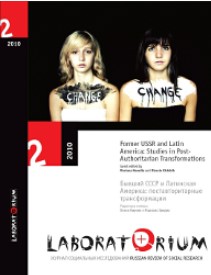ACTIVISTS IN THE TRAP OF ANTI-POLITICS: AN EXPLORATION OF THE POWERLESSNESS OF HUMAN RIGHTS NGOs IN RUSSIA
ACTIVISTS IN THE TRAP OF ANTI-POLITICS: AN EXPLORATION OF THE POWERLESSNESS OF HUMAN RIGHTS NGOs IN RUSSIA
Author(s): Françoise DauceSubject(s): Human Rights and Humanitarian Law, Civil Society, Political history, Government/Political systems, Political behavior, Politics and law, Politics and society, Post-War period (1950 - 1989), Transformation Period (1990 - 2010), Sociology of Politics
Published by: Центр независимых социологических исследований (ЦНСИ)
Keywords: Human Rights; NGOs in Russia; civil society; Gorbachev's Russia; Socio-political movements; Soviet Russia; Vladimir Putin;
Summary/Abstract: In Russia, the “democratic transition” took place about ten years after the transitions in Latin America: the democratic period began in Argentina in 1983, while the Soviet Union disappeared in 1991. Many comparative works have highlighted the role played by civil societies in the fall of these authoritarian regimes (Okuneva 1994; Khoros 1998; Vizgunova 2001; Vorozheikina 2001; Meier-Dallach and Juchler 2002). Andrew Arato and Jean Cohen (1993:2) were “truly impressed by the importance in East Europe and Latin America, as well as in the advanced capitalist democracies, of the struggle for rights and their expansion, of the establishment of grassroots associations and initiatives and the ever renewed construction of institutions and forums of critical publics.” However, ten years later, at the end of the 1990s, as disappointment with the democratization process grew, scholars insisted that the weakness of civil society in Russia was to blame for the failure of the transition. “As regards civil society, it is profoundly isolated: the voluntary and independent union that realizes concerted action is a rarity in our country. Citizens retreat in the face of the state, which, having established complete control over the political sphere, never ceases to extend its participation in the social sphere,” writes Maria Lipman (2006:2). Russian sociologists highlight the differences between Russia and the Latin American countries. Tatiana Vorozheikina (2001:8) underlines similarities in the state’s control of social organizations in Stalin’s USSR and in the Latin American dictatorships, but considers that “in the Latin American countries (Brazil, Argentina, Chile, Peru, and Mexico), the dominance of the state over society was not as strong [as in Russia].”
Journal: Laboratorium. Журнал социальных исследований
- Issue Year: 2/2010
- Issue No: 2
- Page Range: 86-102
- Page Count: 17
- Language: English

